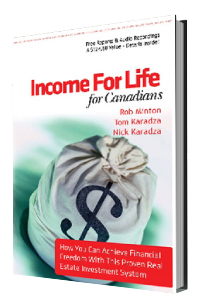Your Real Estate Investment Business Plan
We were recently asked to answer some high level real estate investment business plan questions for a national Canadian magazine. They were putting a piece together for someone looking to get started with real estate investing.
Through the magic of editing the article ended up carrying only a small portion of our answers ... so ... here's the unedited answers to the original questions in all their glory ;) The nice image in the corner is by theplerolsen
Enjoy!
1. What are some things to consider when starting out?
Real estate investing is a business so naturally you need a real estate investment business plan. Spend some time deciding how much capital you have to begin with and how much time you are willing to invest. These decisions made early will help you decide what types of transactions you want to get involved with.
Also, it's important to read and acquire good real estate information but there's no need to spend years buried in theory. Find an experienced mentor, surround yourself with an experienced team of professionals and then get started. Ultimately the people around you will increase the chance of success of your real estate investment business plan. Many beginner investors don't realize this critical point and focus on the "the deal" instead of the people. A solid real estate investment business plan is more important to you than finding one good deal. Good deals are everywhere, a solid real estate investment business plan will keep you going in the right direction.
2. How is buying your first investment property different from buying a primary residence?
When you buy an investment property there will be several differences. However, with residential real estate investing (properties with four units or less) the differences are mostly minor.
The primary ones to be aware of are mortgage insurance and property insurance.
If you put less than 20% down on a residential investment property there is mortgage insurance just like a primary residence, however, the rates for investment properties are typically much higher. You will want to be aware of these fees when working out the carrying costs of the property. Also, the property insurance you will need is slightly different. You will want rental property insurance. If you have tenants in the property then you may want to request that they obtain contents insurance. That way you have insured the property yourself and the tenants have insured their belongings inside.
If you buy an investment property with 5 or more units you'll be dealing with commercial mortgages. These mortgages have extra fees associated with them. The most common are mortgage broker fees that are charged with commercial mortgages and commercial property appraisal fees. You'll want take this into consideration in your real estate investment business plan.
And if you're buying a property to tear it down completely and rebuild the home then you will likely require a construction loan. This type of loan product allows you to draw more money from the lender at predetermined stages of completion. You'll want to get a complete understanding of when you will have access to the funds to that you can plan accordingly. With this make sure you have your real estate investment plan reviewed by your banker so that you are on the same page and financing hiccups don't kill your build. You don't want to become a motivated seller with a half-built property.
3. What are some tips on negotiating?
Timing, information and strategy are keys to negotiating an investment property. Any long-term real estate investment business plan should include continued education in sales and negotiation. A small 3% savings on a $300,000 property is $9,000 in your pocket.
Unlike with a primary residence, you will likely have much more flexibility with your closing date when buying an investment property. Use that to your advantage. You may want to offer a quick closing instead of offering the seller's asking price. You would be amazed at how quickly you can negotiate a favourable price by using the closing date to your advantage.
Also, with the use of public records, you can find out when the property was purchased and for how much. If the property was purchased within the last year or two for a substantially lower price, perhaps there is more flexibility on the amount you purchase the property for. Or if the seller has moved into another home, perhaps they are making multiple mortgage payments and are motivated to sell. When you find out any information on the seller's situation, ask yourself how you can use that to your advantage.
And lastly, if you are ever verbally negotiating a price try not to be the one who names a number first. Let the seller speak first. If you answer first, you could be paying a lot more for the property than required. Perhaps the seller was willing to accept much less than your first offer. If you are asked how much you would offer on a property answer with a question. For example, "If I was able to close on the property quickly what would be the best you could do?".
4. What are some short term and long term goals to keep in mind with your real estate investment business plan?
Initially, you will want to focus on cash flow. Calculate how much positive cash flow will the property produce every month.
No matter how you do the math if the property costs you money to carry then it likely isn't a very good investment. Many beginners convince themselves that a negative cash flow property is a good investment because the appreciation of the property will more than make up for the monthly losses. That strategy backfires more often than it succeeds. Ask anyone who purchased at the top of a market cycle. Appreciation of a property can never be guaranteed. Be suspicious of anyone who tells you otherwise.
Long-term you will want to focus on how large of a real estate asset base you would like to own. Positive cash flow real estate will produce monthly income and pay down the mortgage. Over time you'll own the asset free and clear. At that point, the positive cash flow will be much higher, and your net worth will have increased substantially. You can then refinance and pull out substantial amounts of capital or use the cash flow for other investments. And if you do pull out some equity on a rental property your tenants will help pay the mortgage down again. This is what makes real estate such a beautiful thing!
So in your real estate investment business plan decide initially on a cash flow amount you would like to achieve on each property to make it a good investment. Then decide how much real estate you will need to own "free and clear" to produce the income you desire.
5. Is it more profitable to manage a property on your own, or hire a property manager?
If it's a single-family home or anything up to a four-unit property it will be much more profitable to manage it on your own. Good property managers do exist but can be tough to find (click here for 6 things to look for when interviewing a property manager). Property maintenance and unexpected repairs can eat up cash flow at an alarming rate, especially when you pay a premium via a property manager to handle these expenses.
If it's a larger commercial property (5 or more units), you may find it too time-consuming to manage yourself and a property manager will be a requirement. A vacancy rate and property management fees should be included in your real estate investment business plan when working out the carrying costs of these properties.
Also, as a beginner, it's very important to understand how to manage a property successfully yourself. The experience you gain managing a small residential investment property will be invaluable to you when you do eventually hire a property manager because you will have an intimate understanding of how the property should be run.
6. In your opinion, what is the most sound type of real estate investment? (ex. Flip, buy-hold-rent, etc.)
A positive cash flow buy-hold-rent property is by far a superior investment. Although "flipping" homes sounds fun and looks sexy on TV it is more like speculating than investing. When you flip a property you try to buy it for one price hoping that someone else buys it from you for a higher price in the future.
Even if you put some great improvements in the property you'll have mortgage payments and renovation costs during the time you hold it. If the market changes during this time you could be left holding the property much longer than anticipated. Each month that you hold the property with money going out to cover carrying costs and no money coming in you will gradually turn into the classic "motivated seller" other buyers are looking to take advantage of.
Also, when flipping properties you usually have to deal with contractors and suppliers. You can end up turning yourself into a project manager instead of an investor. It can be more like creating a new job for yourself than anything else. Calculate how many hours you will spend on flipping the property and then divide it by the expected profit after taxes, real estate fees, legal fees, mortgage payments, insurance, mortgage payments, property taxes and insurance. If the number comes out lower than expected don't be surprised. You wouldn't be the first person who figured they could have made more money with less stress flipping burgers instead of flipping homes!
A sophisticated real estate investment business plan is looking to build an asset base of cash flow properties. They invest their money and look for a good return on their money quickly. They are generally not "flippers".
True investors look to buy and control assets. Look at Warren Buffet, he buys enough shares to control a company. He then uses the cash flow of the company to make other investments. A buy-hold-rent strategy is very similar. You are buying the property to control the asset and then direct the cash flow to your own benefit.
If you do decide to flip you must purchase well below market value. You will likely go over any budget you set. Check your numbers and then have a mentor review them.
7. What are your top 5 real estate investing tips?
i. Your real estate investment business plan should always focus on real estate in fundamentally good communities. Look for population growth, higher than average family incomes and expanding transportation routes. These communities hold their value well and will often appreciate strongly.
ii. After you've found a good community then find a solid property. An attractive home will always rent easier and sell faster. You protect yourself by purchasing a good property in a good community. And starter homes will typically not rise and fall as fast and hard as high-end luxury real estate.
iii. Don't buy a property because it's a "good deal". Buy a property because it is in demand and will sell or rent quickly.
iv. Your real estate investment business plan should involve surrounding yourself with an experienced team. The team is more important than the property because they will steer you around obstacles that you may not even be aware of. Look for real estate brokers, mortgage brokers, lawyers and accountants with real estate investing experience and not just real estate experience.
v. Most people create a real estate investment business plan that will overestimate what they can accomplish in one year and underestimate what they can accomplish in ten. Keep the big picture in mind and never stop driving towards it! Keep things in perspective and expect bumps along the way, ultimately they make you stronger.
Return from Real Estate Investment Business Plan to the Real Estate Investing Guide by clicking here.
Some Cool Free Stuff...
Step 1:
|
Grab a free digital copy of our real estate investing book, Income For Life For Canadians, right here. This book has been downloaded over 22,597 times and has helped hundreds of investors kick-start their investing with simple and straight forward strategies that you can implement right here in Canada. |
 |
|
You'll also receive our weekly [Your Life. Your Terms.] email newsletter with the latest investing updates and videos. |
Step 2:
|
Free Weekly Investing Videos & Articles: Get the latest updates and join the over 10,000 other Canadians enjoying the weekly [Your Life. Your Terms.] email newsletter. The email is sent out each Thursday. And as a little bonus we'll give a FREE digital copy of the book, Income For Life For Canadians, too! |
Your Life. Your Terms.
Step 3:
|
Free LIVE Investing Class: Do you live in the Greater Toronto or Golden Horseshoe Area? Come out to our next introductory "Investing in Nice Homes in Nice Areas" Real Estate Class. |
 |
|
It's 90-minutes and you'll learn a ton - promise!Thousands of investors have now joined us for this class and the feedback has always been amazing. |





